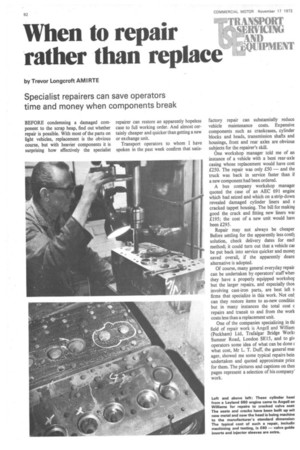When to repair rather than replace
Page 98

If you've noticed an error in this article please click here to report it so we can fix it.
by Trevor Longcroft AMIRTE
Specialist repairers can save operators time and money when components break
BEFORE condemning a damaged component to the scrap heap, find out whether repair is possible. With most of the parts on light vehicles, replacement is the obvious course, but with heavier components it is surprising how effectively the specialist repairer can restore an apparently hopeless case to full working order. And almost certainly cheaper and quicker than getting a new or exchange unit.
Transport operators to whom I have spoken in the past week confirm that satis
factory repair can substantially reduce vehicle maintenance costs. Expensive components such as crankcases, cylinder blocks and heads, transmission shafts and housings, front and rear axles are obvious subjects for the repairer's skill.
One workshop manager told me of an instance of a vehicle with a bent rear-axle casing whose replacement would have cost £250. The repair was only £50 — and the truck was back in service faster than if anew component had been ordered.
A bus company workshop manager quoted the case of an AEC 691 engine which had seized and which on a strip-down revealed damaged cylinder liners and a cracked tappet housing. The bill for rnakiu good the crack and fitting new liners wae £195; the cost of a new unit would havt been £295.
Repair may not always be cheaper Before settling for the apparently less cost13 solution, check delivery dates for eacl method; it could turn out that a vehicle cat be put back into service quicker and mone3 saved overall, if the apparently deare alternative is adopted.
Of course, many general everyday repair can be undertaken by operators' staff when they have a properly equipped workshop but the larger repairs, and especially thos involving cast-iron parts, are best left t1 firms that specialize in this work. Not ont can they restore items to as-new conditio but in many instances the total cost c repairs and transit to and from the work costs less than a replacement unit.
One of the companies specializing in thi field of repair work is Angell and William (Peckham) Ltd, Trafalgar Bridge Work: Sumner Road, London SE15, and to giv operators some idea of what can be done a what cost, Mr L. T. Duff, the general mar ager, showed me some typical repairs bein undertaken and quoted approximate price for them. The pictures and captions on thes pages represent a selection of his company' work.
































































































































































